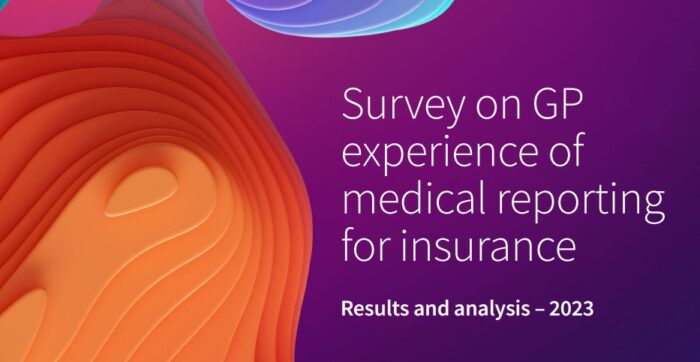The Association of British Insurers (ABI) is calling on insurance firms to use electronic health records (EHRs) and make it easier for general practitioners to do so as well.
It also wants insurers to pursue ways to cut multiple requests for similar medical information from one customer, noting this was inefficient and disproportionately affects those with complex medical histories.
And it is calling for a review of the statutory mechanism for obtaining medical information for insurance.
The calls come in an ABI report making nine recommendations to insurers to increase the introduction and take-up of EHRs with the aim of improving and easing returns for patient record requests with underwriting applications.
Research of GPs conducted by the ABI for the report showed electronic health records were returned to insurers weeks quicker on average than paper reports.
And despite negative preconceptions, surgeries reported electronic requests were easier and quicker to fulfil.
Alongside ensuring they are set up to use electronic health records, the trade body also urged insurers to work with software providers to reduce complexity around reports and collaborate with GP representative bodies and regulators to explore ways to limit the number of requests sent.
The nine recommendations aimed at increasing uptake of EHRs are:
For primary care and the insurance industry to drive engagement between primary care and the insurance industry
For insurers and GPs to collaborate constructively to reduce delays and barriers to insurance for consumers and to cut the administrative workload for practices to free up time for patients.
For primary care to work at ensuring wider take up of EHR software
This should include more practices adopting EHR software which should be actively encouraged by bodies representing the primary care community.
For software providers, primary care, NHS, and the insurance industry to raise awareness about EHR software
This would see software providers continue to raise awareness and educate GPs about EHR software, while the insurance industry, the NHS, and bodies representing primary care would also raise awareness to improve outcomes for patients and customers. Software providers would look to build and disseminate “robust” evidence of value for money to demonstrate that their software reduces administrative burden and improves data security and accuracy. GP practices would also benefit from the ability to trial the software which would allow them to assess the value for money for their organisation without commitment.
For software providers to continue to refine software offering to address specific issues raised in the report
Software providers would continue to improve products based on their own engagement with users as well as the findings in the report. This would improve GPs’ confidence in the ability of technology and reduce the time required to check reports for inappropriate information. Providers would also ensure the software can easily accommodate complex and non-standard requests.
For government, regulators, and the NHS to review responsibility for medical reports
The government, NHS and the ICO would collectively review responsibility for the provision of medical reports by GPs to third parties. Advances in technology across the health and insurance sectors, alongside learnings from the recent introduction of powers for a range of health professionals to certify and issue fit notes, could be applied to medical reporting to insurers.
For government and regulators to review the statutory mechanism for obtaining medical information for insurance purposes
The ABI cites 2015 comments from the information commissioner who said that: “if the specific statutory mechanism provided by legislators for obtaining medical information for insurance purposes is failing to provide the information within the timescales the industry needs, then those affected should seek to review that mechanism and have this subjected to proper parliamentary scrutiny with a view to changing it”. Alongside a wider review into the responsibility for health reports, government and the ICO would work with the insurance industry to review the relevant statutory mechanism and assess whether it remains fit for purpose.
For the insurance industry to ensure consistent take up of EHRs and an additional EHR instruction when sending a request for medical evidence to a GP
The ABI maintains it is important that all insurers are set up to use EHRs. For insurers that are set up to use EHRs, the ABI adds practices should always be given the option of returning an EHR, even if it is unclear whether the practice will do so. The leading reason GPs with EHR software still produce a proportion of paper insurance reports is that they receive requests for paper reports from insurers, as opposed to requests for EHRs.
For the insurance industry to reduce complexity
Insurers would work with software providers to explore ways of reducing the complexity of non-standard requests or requests for individuals with complex medical histories. Limiting the complexity of reports would increase GPs’ comfort using EHRs for a greater proportion of requests.
For the insurance industry, GP representative bodies and regulators to explore ways to limit the number of requests sent to a GP when an individual applies for cover or makes a claim through multiple insurers
When an individual has a complex medical history, they may apply for insurance cover through multiple insurers to try to find preferable rates. In this circumstance, they may provide each insurer with consent to request medical evidence. This means that a GP will receive multiple requests for similar information, which duplicates labour and adds to GP workload. The ABI adds it is also an inefficient customer experience that disproportionately affects those with complex medical histories. In addition, it says it is an opportunity to develop a solution to streamline this process which will need to involve the insurance industry, GP representative bodies and regulators to ensure that information continues to be shared safely, with full customer consent and in a manner that is compliant with legislation
